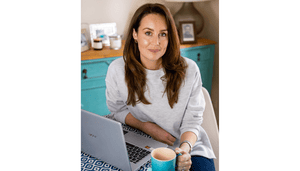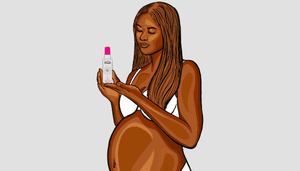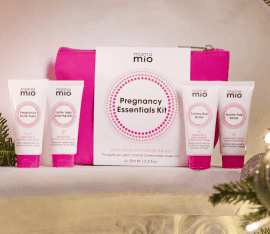As part of our #BehindTheBump campaign, we caught up with Jess, aka @thefatfunnyone, to talk all things tocophobia, Oprah and the NHS.
https://www.instagram.com/p/BmqB2P5nRLe/?taken-by=thefatfunnyone
What inspired you to pursue your career in mental health activism and motivational speaking – was there a specific trigger or a certain series of events?
Probably the birth of Sophia, I wanted to be a role model for her and I think she was a massive turning point for me to make a change. When I had her, I never felt good. I was confident on the surface but I had loads of issues with how I felt about myself as a person, as an individual, with my confidence and my self-esteem; I thought I need to make a change, because ultimately I don’t want her to ever feel how I feel now.
She was my main motivation to turn things around. So I started by having a massive social media detox which was a huge thing for me, I removed everyone that made me feel bad about myself. I very rarely ever follow celebrities, people who I can’t relate to. And then I started following people like Tony Robbins, Oprah; people who I would read a post from and think ‘yes, I feel good today’. Lots of plus size models, different bodies and different people!
I’ve always been quite good at talking so I just thought, maybe I could just tell my story, I never set out to be a motivational speaker (although now I’m kind of life ‘I want to be the next Tony Robbins’). I already had my blog but I felt like people would get more of an idea of me if they could hear me speak, so I wanted to put a person behind the words on the internet. So I did my first event and it was just amazing, I got such a buzz from it. People could come up and physically hug me, it wasn’t this virtual ‘thanks so much’, and it was so uplifting and so empowering that I got a bug for it, and now I can’t shut up!
https://www.instagram.com/p/BjXwENsnwgw/?taken-by=thefatfunnyone
That’s really inspiring, it must be so uplifting to know you’re impacting people like that. Have you had many negative responses at all?
I guess when you’re honest and open it does come with down sides, people aren’t that nice on the internet and it can be hard. I’ve had some awful things said and it does genuinely make me feel rubbish but ultimately, for every one horrible person there’s like a hundred nice ones! I think when people say things like ‘you’ve changed my life’ or ‘I finally don’t feel alone’ it just gives me such a good reason to talk, it makes me even more honest, more authentic, more open!
You speak on your blog about managing and overcoming your tocophobia, which is probably something that a lot of people haven’t heard of but some may be experiencing, can you tell us a bit more about it.
What made you aware it was something you had, what steps did you take to manage it and do you have any advice for other women who may be experiencing it?
The main point I knew it didn’t feel normal was when I wasn’t able to sleep. I knew I’d feel anxious, I knew I’d have concerns, but then it got to a point where I wasn’t sleeping for days on end and I felt horrific and I knew then that something wasn’t right. I tried to speak up but sort of got brushed off.
It was actually the day when I went to the hospital to meet the head of the midwifery unit and she was trying to convince me not to have a C-Section. She was basically trying to convince me that I’d be ok, but she did it in the most horrific way, saying ‘if you have a C-Section the risks are these, you’re not considering the health of your baby’ and she just put so much guilt on me.
When we left and we got to the car park I just lost it. I had a massive breakdown, I was hysterically crying and so my husband called my mum and said ‘I don’t know what to do’ and my mum said ‘take her back in there and show them how bad she is, they need to see’.
So he took me back in and we stood at the desk, and I remember the room was so full of people waiting for their scans, and I was just hyperventilating, trying to hold it together. This midwife came out and took me into a room and asked me what was wrong, and so I told her what the other midwife had said, and she was taken aback, she said ‘ok I need to speak to someone about this, you need to write this all down.’
So I wrote this four-page letter to the hospital and they referred me to a consultant and within minutes he said, ‘you have tocophobia’ and as soon as it had a name I felt legitimised. When people minimise whatever it is you’re going through, be that anxiety, depression, whatever, it makes you feel like you’re going crazy.
https://www.instagram.com/p/BiMgmMaHdug/?taken-by=thefatfunnyone
I remember when I was at school, it was the biggest insult to say to someone ‘you’re mental’ but times have changed so much! It wasn’t talked about, even when we knew depression, we only knew depression on tele, we didn’t know what the real experiences of it were or what the different levels of it could be.
I’ve always been quite anxious and always suffered with anxiety, but it became much more apparent when Sophia was born (she was born in 2012 and I was diagnosed in 2014) but because I am so confident and I will go out and do things, people will say ‘you can’t be anxious and depressed, you go out on a night out’. It would make me question it, asking myself if I was being too dramatic because I was still functioning. But I wasn’t, I was depressed and so my best piece of advice for people is just, TALK! Be honest, if someone isn’t listening and you don’t feel like they’re getting it, talk to someone else.
One thing I didn’t know is that at any point in your pregnancy, if something isn’t working you can ask to change; change midwife, change consultant, change hospitals. So if there’s a hospital near you with better mental health facilities or specially trained mental health midwives, go there and ask! They are there to care for you, so if you don’t feel cared for, you have to speak out.
It can be scary because you think that they know best, because they’re educated to, they’re qualified professionals, they know more than you do so if they tell you something’s fine, then you believe that it’s all in your head. But you know yourself better than anyone; you know your body and you know your mind. I realised with my second pregnancy that the safest thing for me was to just talk about it, because if I don’t then I become consumed by thoughts which can become really dark. The more I talk about it, the more support I’m going to receive, because people can’t help if they don’t know what’s wrong.
https://www.instagram.com/p/BiUhJ8jnnhK/?taken-by=thefatfunnyone
How do you think that your experiences with tocophobia affected your second pregnancy? Did you feel as though you had the tools to manage it better?
So in between Bella and Sophia I had a miscarriage. I miscarried at about 10 weeks and when I went to the hospital I was bleeding really heavily and I just knew what had happened, you just know. The doctor said to me ‘we’ve done the test and it’s negative, are you sure you were even pregnant in the first place?’. I was so shocked, I’d been to that same hospital where they’d told me I was.
I was so heartbroken and it made my pregnancy with Bella even more nerve wracking because not only did I have this fear of birth, but I had the additional fear of miscarrying, which I never had with Sophia. So we didn’t tell anybody, which was really hard, because with the middle pregnancy, we told all our close friends and family, and then when we had to tell them that we’d miscarried, it was really, really hard and we didn’t want that again, not just for us but for them.
So we didn’t tell anybody, which was even worse because I couldn’t share how I was feeling. When we finally did, I’d done a lot of mindfulness, I’d done a lot to tackle my anxiety, so I thought to myself, if I can tackle these day to day challenges, surely I can tackle this too.
I invested a lot financially in getting support and so this is one of the things I’m campaigning for, because I spent a lot of money on help, and if you’re not in a position to do that, what would you do? Hypnobirthing courses aren’t cheap, getting a doula isn’t cheap, therapy isn’t cheap, so that has to be some sort of support out there that doesn’t cost the earth.
The NHS are stretched there’s no doubt about it and we’re so lucky to even have that resource in the first place but there is a really small pool of people that just aren’t getting the support they need. But if they invested in these services now, they’d save money in the long run because you’re tackling the root cause of the problem. Mental health seems to be something that we react to and we’re not proactive enough.







